As described in the introduction to this website, the interest for the vocabulary of intellectual life occupied an important part of my research between around 1980 and 1995. It started with an article on the terminology used by the rising universities (see Art. 5), followed by the monography Terminologie des Universités au XIIIe siècle, published in 1987 (see Publications, Books, 6). This book appeared in the series “Lessico Intellettuale Europeo”, then under the direction of Tullio Gregory; it was thoroughly revised in collaboration with a professional “editor”, an enriching experience for me. Even today, this study seems useful for checking the exact meaning of some lesser known words that refer to concepts used in the academic world of the time or even to better understand the meaning and origin of terms that are still in use today, such as ‘faculty’. I reproduce the pages concerning that term:
In this period, the CIVICIMA (see introduction) published nine volumes on the vocabulary of various fields of intellectual life, in the series “Etudes sur le vocabulaire intellectual du moyen âge”. They are the following:
(1) Actes du colloque « Terminologie de la vie intellectuelle au moyen âge » (Leiden / Den Haag 20-21 septembre 1985), Turnhout 1988 (Etudes sur le vocabulaire intellectuel du moyen âge 1).
(2) Vocabulaire du livre et de l’écriture (Actes du colloque Paris 1987), Turnhout 1989 (Etudes sur le vocabulaire intellectuel du moyen âge 2).
(3) Méthodes et instruments du travail intellectuel au moyen âge. Etudes sur le vocabulaire, Turnhout 1990 (Etudes sur le vocabulaire intellectuel du moyen âge 3).
(4) O. Weijers, Dictionnaires et répertoires au moyen âge. Une étude du vocabulaire, Turnhout 1991 (Etudes sur le vocabulaire intellectuel du moyen âge 4), 212 pp.
(5) Vocabulaire des écoles et des méthodes d’enseignement (Actes du colloque Rome 1989), Turnhout 1991 (Etudes sur le vocabulaire intellectuel du moyen âge 5).
(6) Vocabulaire des collèges universitaires (XIIIe-XIVe siècle) (Actes du colloque Leuven 1992), Turnhout 1993 (Etudes sur le vocabulaire intellectuel du moyen âge 6).
(7) La formation du vocabulaire scientifique et intellectuel dans le monde arabe, sous la direction de Danièle Jacquart, Turnhout 1994 (Etudes sur le vocabulaire intellectuel du moyen âge 7).
(8) Vocabulary of Teaching and Research Between Middle Ages and Renaissance (Actes du colloque London 1994), Turnhout 1995 (Etudes sur le vocabulaire intellectuel du moyen âge 8).
(9) Le vocabulaire des écoles des mendiants au Moyen Age, actes du colloque, Porto (Portugal) 11-12 octobre 1996, édités par Maria Cândida Pacheco, Turnhout 1999 (Etudes sur le vocabulaire intellectuel du moyen âge 9).
After these nine volumes, we decided that we had covered most of the field and that it was time to close the series with a volume resuming the results and at the same time completing it. We entrusted this task to a young researcher, Mariken Teeuwen, who from then on became my collaborator at the Huygens Instituut. She published the final volume of the series in 2003:
(10) Marieken Teeuwen, The Vocabulary of Intellectual Life in the Middle Ages, Turnhout 2003 (Etudes sur le vocabulaire intellectuel du moyen âge 10).
Regarding the field of intellectual vocabulary, see also the List of publications, art. 9 (on the term collegium); 14 (on the appellation of university masters); 17 (on the specific character of the vocabulary of universities); 21 (on the vocabulary of teaching and examinations); 23 (on the vocabulary of dictionaries and repertories); 24 (on the vocabulary of the Collège de Sorbonne); 33 (on the term problema); 52 (on the term disputatio); 66 (on conclusio).
For most of the articles published before 2011, one can also consult the collection of articles entitled Etudes sur la Faculté des arts dans les universités médiévales. Recueil d’articles (see Publications, Book 20). Here I reproduced the articles concerning the various topics I treated during my research up to that year, completed and corrected. Here is the table of contents:
The ‘Glossaire du latin philosophique’
The volume Les innovations du vocabulaire latin à la fin du moyen âge: autour du Glossaire du latin philosophique was published in 2010 in the series “Studia Artistarum” (see art. 65). Here I gave an account of the rich collection of card files with handwritten or typed quotations from an important number of philosophical texts, resulting from a CNRS research project initiated in 1944 and elaborated during many years by a team of scholars, for a long time under the direction of Pierre Michaud-Quantin, At the end of the 1960s, a large number of boxes contained around 300.000 cards. In 2007, by a rescue action in collaboration with young and energetic colleagues, this treasure was transported from a hardly accessible place in the old Sorbonne building to the IRHT, where it was from then on easy to consult. Meanwhile, the cards have been digitalized and the electronic version can be found on the website of the IRHT.
In order to make the ‘Glossaire’ better known to the medievalists, we organised a one-day colloquium on the innovations of Latin vocabulary at the end of the Middle Ages. In Annexe 2, I gave a description of the various parts of the card files:
Sometimes, for often used terms, an index provides an overview of the contents of the main file, for instance for the term amor:
The main file consists of mainly handwritten cards, with sometimes the indication of the source and the period added in the form of a stamp for more important authors, like Peter Lombard. Inside the sections concerning a particular term, the cards are in chronological order. The simplest form of a card is like this:
Instrumentum XIIIe s.
Gilles de Rome
De ratione autem instrumenti est quod agat ut applicatum ab alio
Quodlibet V, q. 1, concl.
Lovaniis, 1646, p. 263a
The bibliographical information is of course outdated, but it is easy to find the occurrence in the modern edition.
The (digitalised) card system may seem outdated itself, since so many sources have been treated in online databases like the Library of Latin Texts; however, the advantage of the Glossaire is that only significant examples have been recorded, thanks to human intervention. Moreover, for the numerous authors not (yet) treated by electronic device the Glossaire is very precious indeed.
Other parts of the files contain ‘semantic articles’, written or typewritten on A5 sheets, which offer short semantical studies; and sometimes we have real ‘dossiers’, a kind of small monographies, like the ones composed by Hélène Merle (see Archivum Latinitatis Medii Aevi 43 (1979-80) pp. 142-147). However, the bulk of the Glossaire is of course the extensive collection of small cards, giving basic information on where a certain term may be found in the philosophical sources of the Latin Middle Ages.
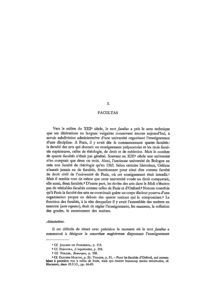
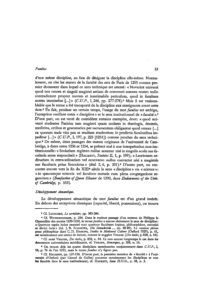
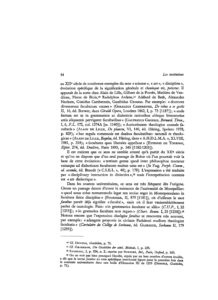
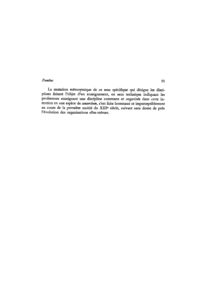

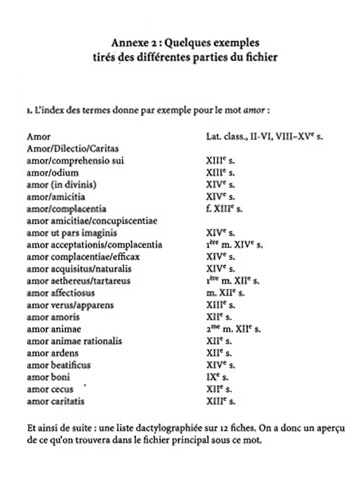
Commentaires récents